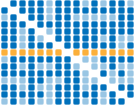A folyami költő (Hungarian)
45 éves folyami költő vagyok.
Bármit jelentsen is ez,
számolni kell vele,
ha másnak nem is,
legalább nekem.
Folyami költő, a Duna bal partján,
magyar, és ráadásul dohányos.
De mindenkinek megvan a maga baja.
Egyébként nem akarok panaszkodni,
eszem ágában sincs,
csak kinézek az ablakon
és nézem a Dunát.
Szakadatlan búcsú és megérkezés,
folyamatos jövés-menés a folyó.
Vízcseppek generációi hullámzanak,
torlódnak egymás hegyén-hátán,
a fiúk leöldösik az apákat,
kis csitrik bukdácsolnak vidáman
ösztövér öregek között,
de a partról nézve tükörsima,
és a megszólalásig hasonló
a tegnapi folyó és a mai folyó.
Ha fúj, ha esik,
vonul a maga medrében,
és nincs az az erő,
amely megállíthatná,
mert akkor a folyó
megszűnne folyó lenni,
a múló
megszűnne múlni,
és a folyami költő
becsukhatná a boltot.
Hiszen a folyami költő
az elmúlásból él, abból,
hogy semmi sem tart örökké,
csak a folyó vonulása,
már ha nem szárad ki belőle a víz.
De hát miért száradna ki?
Nem vagyunk Arizonában, Mexikóban,
azok a folyómedrek (arroyos)
nem is teremnek folyami költőket,
hanem más költőket,
meg nagy fehér és fekete kutyákat,
akik izgatottan rohangálnak a kihalt,
kiszáradt folyómedrekben,
valami élet után szimatolva,
ami volt és lesz,
de ami éppen rejtezkedik.
Szó se róla,
rokonai ők is a folyami költőnek,
ki nem rokona neki,
akit a mulandóság édessége
és keserűsége táplál,
aki születése pillanatától kezdve
emlékek foglya,
aki maga sem egyéb,
mint a jövőre vetülő emlék,
amit ha megérintesz, meggyógyulsz,
vagy csak sírsz, nevetsz felváltva,
és csak sír, nevet felváltva,
mert sietnie kell, mint a kakasnak
köszönteni a reggel-estét,
szeretnie és gyűlölnie,
építenie és rombolnia,
mert minden egyesülése a válás
csíráit szaporítja benne,
mutasd neki holnaputánját!
megállna, továbbmenne,
ködös víziója a másnap,
sodródik, kapaszkodik, szökdel,
vonul, ahogy a folyó vonul,
és csak a hordalék a parton,
csak az tornyozódik toronnyá,
az a szerelmes, csillogó por,
a mulandó iránti hűség,
a folyami költő versei
a konzervdobozok között.
Folyami költő,
magyar, és ráadásul dohányos,
felállok, kinyitom az ablakot,
egy autóriasztó sivít,
a téren óvodások
rohamozzák a mászókát,
egy kopasz, csenevész fán
helyet foglal egy madár,
azt hiszem, minden rendben,
bármit jelentsen is ez,
azt hiszem, számoltam vele
eleitől fogva. | Uploaded by | P. T. |
| Source of the quotation | https://www.pim.hu |
|
The River Poet (English)
I’m forty-five years old and I’m a river poet
It means what it means,
one must accept it, take it into account,
if not the others, then at least myself.
A river poet, on the left bank of the Danube,
Hungarian, and on top of it all a smoker.
But everyone has his own troubles.
Otherwise I don’t want to complain,
I wouldn’t even dream of it,
I’m just looking out the window,
and gazing at the Danube.
The river is flowing permanently,
uninterrupted farewell and arrival,
unbroken coming and going, that is the river.
Generations of drops are undulating,
they rush head over heels against each other,
the boys are killing the fathers,
early adolescent girls
are stumbling cheerful among solid old men,
but gazing out from the bank
they seem completely identical
the river of yesterday and the river of today.
When the wind blows, when it rains,
it proceeds in its own channel,
and there is no power
to stop it,
because at that time the river
momentarily
stops being the river,
and the river poet
will close up shop.
Because the river poet lives from transitoriness,
the fact that nothing lasts forever,
only the river flowing,
if the water doesn’t dry up from the channel.
But why should it dry up?
We aren’t in Arizona or Mexico,
those arroyos
don’t give birth to river-poets,
but to other poets
and big white and black dogs,
who are excitedly running in the died-out,
dried-out river channels,
sniffing after some life
that was and will be
but that is presently concealing itself.
It’s not a question,
All of them are relatives of the river-poet;
who wouldn’ t be a relative of his,
who is fed by the sweetness of passing time,
and the bitterness of it,
who from the moment of his birth
is a prisoner of memories,
who himself is just memory projected onto the future,
a daguerreotype walking on two legs,
if you touch it you heal yourself,
or you are crying and laughing in turn,
and he is crying and laughing in turn,
because he must hurry, as the rooster
must hurry to greet morning and evening,
he must love and hate,
build and destroy,
draw his foggy vision
into the foggy tomorrow and after-tomorrow,
because all his unifying
contains the seeds of separation,
so he’s climbing up and swinging
like a monkey from branch to branch,
from day to day which, as it must be,
flows like a river flows
and on the bank just a stream
just the sediment is gathering,
that beloved and shining rubbish,
soaked with foreign materials,
that eternal fidelity
to the transitory passing,
the poems of the river-poet
among the cans of preserves.
The river-poet,
Hungarian, in addition a smoker,
I’m standing up, opening the window,
a car alarm shrieks,
kindergarten children on the square
attacking the jungle Jim,
a bird takes its place
on a barren, stunted tree,
I think everything is in order,
it should mean what it means,
I think I’ve taken it all into account
from the very beginning. | Uploaded by | P. T. |
| Source of the quotation | http://www.hlo.hu |
|
